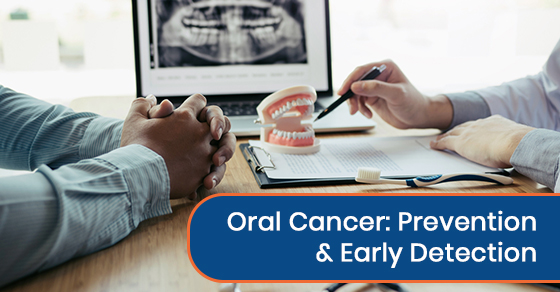Cancer is always a scary topic to discuss but it helps to learn more about how you can prevent it. With some good information, you can feel strong and empowered to navigate any situation that you and your loved ones are in. Oral cancer is one major concern for those in dentistry, and according to The Oral Cancer Foundation, about 53,000 people will be diagnosed with this type of cancer this year.
Why is oral cancer screening important?
Oral cancer has one of the highest mortality rates compared to other cancers, so early detection and prevention are crucial. Not every patient will have noticeable symptoms even if they have oral cancer because the symptoms are barely noticeable in the early stages, which is why oral cancer screenings are so important.
When should I get screened for oral cancer?
During your bi-annual check-ups, your dentist and hygienist will thoroughly look for any changes and lesions in your mouth, although a dedicated oral cancer screening should be conducted at least once every year. Those over the age of 45 are most at risk, but any individual 18 or older should have annual screenings.
Getting a screening is completely painless. Most of the screening is visual, and your dentist or hygienist will conduct a close examination of the maxillofacial and oral regions for any signs of change. Your dentist will begin by feeling the face, glands and neck for unusual bumps. Then they will use dental lasers to look for other abnormal signs and lesions invisible to the eye.
Signs of Oral Cancer
Oral cancer can affect the tongue, cheeks, lips, sinuses, throat, teeth, gums and roof of the mouth or below the tongue.
Oral cancer is unfortunately usually detected much later than other types of cancer. This is why it’s very important to know your body and what is normal or not normal for you. Detecting signs of change early is best. These signs can include:
- A constantly sore throat that never heals
- Unexplained bleeding or numbness in your mouth
- Dentures that suddenly do not fit the same
- You have sores in your mouth that are red or white
- You have a lump in your throat
- There is a thick lining in your mouth
- You have loose teeth
- You have tongue pain
- You have pain in your jaw or stiffness when you chew
Some of these symptoms can be confused with gum disease or having cold sores, so you must see a dentist or doctor for a proper diagnosis.
Causes of Oral Cancer
Genetics and lifestyle habits can put you at risk for oral cancer. Knowing your risk factors is important, so make sure that you speak with your dentist about your family and medical history.
Oral cancer can be caused by the following factors:
- Using tobacco products
- Abusing alcohol
- HPV (human papillomavirus)
- Having a family history of cancer
- Excessive sun exposure (especially during a young age)
It can be surprising, but 25 percent of all oral cancer cases will occur among those who have never smoked and only had alcohol occasionally.
What happens if my dentist finds signs of oral cancer?
The good news is that oral cancer can be treated successfully if caught early.
Your dentist will look at your mouth and take some cells to see if they are cancerous. These cancerous cells can grow uncontrollably, harming your body. The earlier the diagnosis and treatment, the better the chances of survival and recovery. Your medical doctor and your dentist can work together to provide you with the best cancer treatment possible.
Cancer treatments can include chemotherapy, surgery and radiation. There are other treatment options available and you can discuss them with a specialist. There is an 81 percent chance of survival within the first year of oral cancer, but you will be at an increased risk of it recurring later in life.
Since your body is complex and full of interconnected parts and systems, your oral health directly contributes to your overall health. Practising great oral hygiene is the first step to keeping your mouth in a healthy condition.
Patients should consider changing their lifestyle choices concerning tobacco and alcohol. The longer you keep up these habits, the more at risk you will be for oral cancer. Limiting your sun exposure and making sure to wear sunscreen when you go outdoors will also help protect you from harmful UV rays.
And overall, visiting your dentist regularly is a major factor in oral cancer prevention and early diagnosis.
For more information about oral cancer prevention, contact Bloor West Smiles at 416-766-2853 or contact us here.


Sorry, comments are closed for this post.